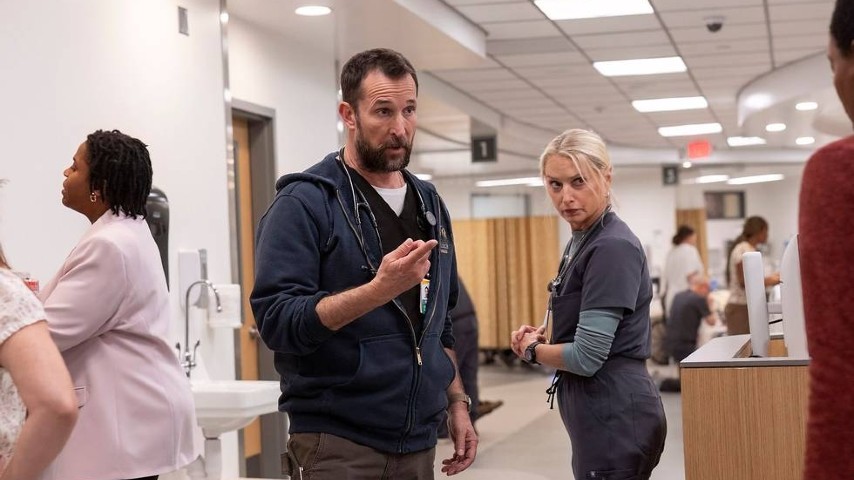And she also offers some compassionate but blunt—and ultimately persuasive—counsel to Eloise: If she denies her daughter the chance to truly live her own life, Christy may never return to her. Of course, it only makes what happens afterward all the more devastating. It’s a testament to Ifeachor’s performance that every tiny flinch of pain, the light of dreadful awareness clicking on in her eyes, already conveys what the blood in her underwear confirms. As she weeps silently, full of grief and horror and rage, I’m not ashamed to say that I cried too.
When The Pitt focuses on a few cases of the week, instead of the total (albeit realistic) blitz of patients, it can truly dig deep and pull out the pathos of its characters. Even Dr. Santos, a character known for alienating colleagues and viewers (well, at least this one), finally gets to crack open her vulnerable side. The mystery of why her male patient who’d taken a fall off a ladder has enlarged breast tissue is resolved with one hell of an answer: The man’s wife, suspecting that he’s been grooming their adolescent daughter, tells Santos that she’s been spiking his coffee with progesterone to lower his libido.
A lesser show would play up the grotesquerie of this desperate act, but the only horror here is the flat, bureaucratic indifference that the hospital team must show: Without the daughter admitting what’s happened, the only person that they can refer to law enforcement is the mom. Even Robby, uncharacteristically, doesn’t fight back on this or show a willingness to circumvent the rules as he has before—notably with the timing of Christy’s pregnancy—a clear sign of how the day has ground him to the nub. The show takes a wise approach to its flashbacks of Dr. Adams’ last moments, layering new images and sounds that magnify its intensity: Here, we see Evans, clad in PPE, telling Robby that he’s got to make a decision about what happens, with the fluorescent lights giving the scene an apocalyptic intensity.
Santos, however, will not allow this girl to go unprotected. The young doctor’s tenacity, which has so far sparked and singed her co-workers, finally has a real and very worthy outlet. She’s not some hotshot; she’s an avenging angel—and it’s a good look for her. Isa Briones displays Santos’ skittering vulnerability in her exploratory conversation with the daughter, who denies that her father is hurting her, which may be true but may also be what someone being groomed, who truly believes that her abuser loves her, would say. And Santos would know.
Persuading one of the hospital guards to stand outside of the dad’s window, she confronts the suspected abuser, who is trapped and prone on the table. Briones channels all of her character’s brittleness into a blade, a hot shiv that she sinks ever deeper into the man’s heart, twisting it as she tells him that she knows what he’s done, walking him through his actions, the actions of every abuser, in the voice of the victim. She gets into how a kiss on the forehead becomes a kiss on the mouth, and a kiss on the mouth becomes fingers inside of her—a violation that will take lifetimes to heal. She ends her righteous fury by threatening to have the man arrested by the “cop” outside of his window, or else outright let him die, if he even thinks of touching his daughter again.
All of the character evolutions in this episode aren’t as heartbreaking. This hour also sees Dr. King put her own experiences as a caregiver for her sister to use with her patients. When Terrance, an ace table-tennis player, arrives at the hospital with a sprained ankle, he might as well be an alien to Dr. Langdon, who is less than bemused by his demands to see an orthopedic specialist as well as his knowledge of clinical terms. However, after checking his chart, Dr. King realizes that Terrance has autism, the same condition her sister has. She knows to turn down the lights and silence the beeping machinery for his comfort. She asks him about his passion for table tennis and explains the exact nature of his illness as well as the brace he’ll have to wear to recover.
She earns high praise from him, and from Langdon, who tells her that she really has a way with the patients. Of course, this is because she’s literally lived with someone who needs ‘round-the-clock care and has done the exhaustive work that doesn’t come with a hefty paycheck or even the cultural respect of being a “healthcare hero.” Dearden remains a standout of the series, flitting from her character’s baseline awkwardness and innate kindness to the myriad of complex emotions familiar to any caregiver, including guilt and love.
Stray observations
- • Whitaker confronts another heart-attack patient, and poor Mr. Milton remains uppermost in his mind. It feels very plausible and poignant that he should be haunted by the memory, but hearing that even ECMO wouldn’t have saved his avuncular patient’s life does seem to help him get over it, even a little.
- • Robby is indeed a Sad Boy. That description is wholly apt.
- • Are we going to get any more about Dr. Collins and Dr. Robby having dated? Because curious ‘shippers want to know.


















![HBO teases new Euphoria, Larry David, and much more in 2026 sizzle reel [Updated]](https://img.pastemagazine.com/wp-content/avuploads/2025/12/12100344/MixCollage-12-Dec-2025-09-56-AM-9137.jpg)






















